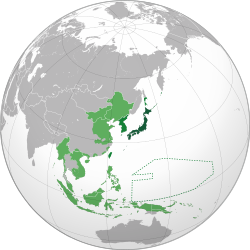Japanese colonial empire
| Japanese Colonial Empire | |||||
| Colonial empire | |||||
|
|||||
|
The Empire of Japan in 1942.
|
|||||
| Capital | Tokyo | ||||
| Languages | Japanese
Local:
|
||||
| Political structure | Colonial empire | ||||
| History | |||||
| • | Established | 1895 | |||
| • | Disestablished | 1945 | |||
| Currency |
Japanese yen, Japanese military yen, Korean yen, Taiwanese yen |
||||
| Today part of | |||||
The Japanese colonial empire constituted the overseas colonies established by Imperial Japan in the Western Pacific and East Asia region from 1895. Victories over China and Russia expanded the Japanese sphere of influence, notably in Taiwan and Korea, but South Sakhalin also became a part of metropolitan Japan as Karafuto Prefecture in 1905.
Following seizures of German territories in 1914, the League of Nations granted Japan mandates over some former German possessions in the Western Pacific after World War I. With the Japanese expansion into Manchuria in the early 1930s, Japan adopted a policy of setting up and/or supporting puppet states in conquered regions. In this less obviously imperialist form Japan controlled many of the states of the Greater East Asia Coprosperity Sphere which came under Japanese influence from 1943 to 1945. Colonial control over the far-flung territories from Tokyo ended after the Allies defeated Japan in 1945: the extent of Japanese governance reverted to the four home islands, the Nanpō Islands, and the Ryukyu islands.
The first overseas territories that Japan acquired were the islands of the surrounding seas. In the 1870s and 1880s, Japan established control over the Nanpō, Ryukyu, and Kurile islands as well as strengthening its hold on the home islands. But this effort was less the initial step toward colonial expansion than it was a reassertion of national authority over territories traditionally within the Japanese cultural sphere. This was similar to nation building in nineteenth and twentieth century Europe.
...
Wikipedia


